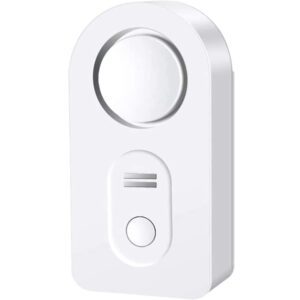Picture this: A single burst pipe can flood your basement, ruin drywall, and cost $10,000+ in repairs (EPA). But with a water leak detector, you’ll catch problems before they drown your wallet. Let’s break down how these gadgets work, why they’re essential for American homes, and how to pick the right one.
The Plumbing Guardian: What’s a Water Leak Detector?
A water leak detector is your home’s first line of defense against sneaky leaks. These devices use smart tech to spot water where it shouldn’t be—under sinks, behind walls, or near appliances. Think of it like a smoke alarm for your plumbing: it screams “Danger!” before minor drips become major disasters.
Why You Need One:
- 1 in 50 US homes files an insurance claim for water damage yearly (III)
- 90% of leaks start small and go unnoticed for weeks
- Smart models can auto-shutoff your water supply—no human needed
The Science Behind Water Leak Detectors
1. Sensor Tech: How They Spot Trouble
Water leak detectors use four main methods to catch leaks:
A. Probe Sensors (Conductive)
- How it works: Two metal probes detect water’s conductivity (like licking a 9V battery)
- Best for: Puddles under washing machines or water heaters
- Pro tip: Avoid using near saltwater (false alarms!)
B. Humidity Sensors
- How it works: Measures airborne moisture levels
- Best for: Bathrooms or crawl spaces prone to condensation
C. Flow Monitors
- How it works: Tracks water flow through pipes via AI algorithms
- Best for: Whole-house protection (spots micro-leaks)
D. Temperature Sensors
- How it works: Alerts if pipes freeze (common in Midwest winters)
- Best for: Unheated garages or vacation homes
2. Alert Systems: From Beeps to Brains
Once a leak’s detected, here’s how detectors warn you:
| Alert Type | What Happens | Best For |
|---|---|---|
| Siren (85–100 dB) | Ear-piercing alarm like a smoke detector | Basements/empty homes |
| Smartphone Alert | Push notifications via apps | Remote monitoring |
| Auto-Shutoff | Closes main water valve automatically | High-risk households |
Types of Water Leak Detectors: Pick Your Protector
1. Spot Detectors
- Looks like: Hockey puck
- Where to place: Under sinks, near toilets
- Example: Govee WiFi Water Detector ($29)
2. Cable Sensors
- Looks like: 6-ft snake with probes
- Where to place: Basement floors, behind fridges
- Example: Honeywell Lyric ($59)
3. Smart Systems
- Looks like: Techy wall unit
- Where to place: Main water line
- Example: Phyn Plus ($699 – detects leaks as small as 1 drip/minute)
4. Whole-Home Guardians
- Looks like: Professional-grade kit
- Where to place: Integrated with plumbing
- Example: Flo by Moen ($499 – learns your water habits)
How to Install a Water Leak Detector (DIY in 10 Mins)
Step 1: Identify hot zones (water heater, washing machine, basement)
Step 2: For spot detectors:
- Place on flat surfaces
- Avoid steam-prone areas (hello, false alarms!)
Step 3: For smart models: - Connect to Wi-Fi via app (like setting up a smart speaker)
- Test with a wet paper towel
Pro Tip: Renters? Use battery-powered detectors—no drilling needed!
Top 3 Water Leak Detectors for US Homes
1. Best Budget: YoLink Smart Water Sensor ($25)
- 1/4 mile range (yes, really)
- Works with Alexa
2. Best Smart: Flo by Moen
- AI learns your shower schedule
- Reduces water waste by 15%
3. Best for Big Homes: Phyn Plus
- Monitors water pressure 24/7
- Installs on main water line
5 Signs You Need a Water Leak Detector NOW
- Your water bill spiked (12,000+ gallons/month for a family of 4 = trouble)
- Moldy smells in bathrooms
- Warped floorboards
- Pipes older than 20 years
- You’ve filed a water damage claim before
FAQs: What Americans Ask
Q: “Can they detect slab leaks?”
A: Only whole-home systems like Phyn can.
Q: “Do they work during power outages?”
A: Battery-powered models do (stock up on Energizer Lithium!).
Q: “Are they pet-proof?”
A: Most ignore pet accidents, but keep cords away from chewers.
The Cost of Ignoring Leaks
Skip a $50 water leak detector, and you risk:
- $2,500+ hardwood floor replacement
- $6,000+ mold remediation
- 20% higher home insurance rates
Final Verdict: Better Safe Than Soaked
Water leak detectors are no longer luxury gadgets—they’re must-haves for US homeowners. Whether you choose a basic alarm or a smart system that texts you during vacations, these devices pay for themselves by preventing disasters. Ready to sleep soundly? Click below to explore top-rated models tailored to your home size and budget.


